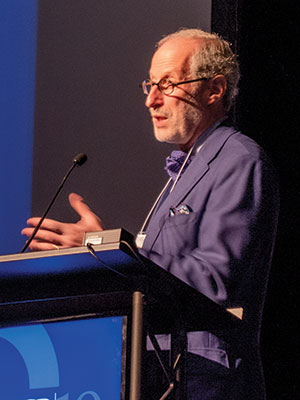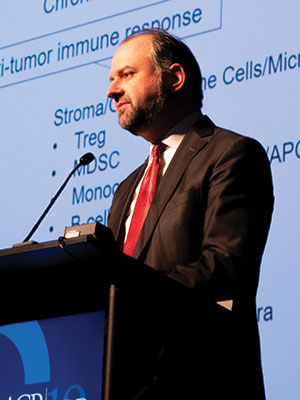
The Sunday morning Basic Science session Adverse Outcomes of Cancer Immunotherapies, focused on the clinical manifestations of immune- related adverse events (irAEs) associated with cancer immunotherapies, including the molecular pathogenesis, tools that aid early diagnosis and treatment, and the shared mechanisms and relationships with primary autoimmune diseases.
Ryan Sullivan, MD, Associate Director of the Melanoma Program at the Massachusetts General Hospital Cancer Center, discussed the spectrum and frequency of irAEs associated with immune checkpoint inhibitor therapy.
“Immune checkpoint inhibitors are a new type of therapy for cancer that are becoming increasingly used for the treatment of numerous malignancies as single agents and in combination with other anti-cancer therapies,” Dr. Sullivan said. “And while it is not hyperbole to say that the development of these agents over the past decade has truly transformed the care of cancer patients, there are also toxicities that are unlike any type of therapy. Namely, these drugs are associated with auto-immune toxicities that range from trivial to annoying to serious to fatal.”
Rheumatologists need to know about these types of toxicities because underlying rheumatologic conditions often flare in the setting of these agents as well as de novo rheumatologic toxicity, including arthritis, sicca syndrome, and vasculitides.
“Anything in the body can get inflamed, and it’s important to remember that early recognition and treatment are critical, as is the judicious use of systemic steroids,” Dr. Sullivan said. “Diagnosis is key to optimal management, as overtreatment may affect anti-cancer effects, and a multidisciplinary team is key to the optimal management of these toxicities.”
Biomarkers to improve patient selection for less toxic regimens and to better identify patients who will develop severe toxicity are needed, he said, and there are emerging data to support that.

Jeffrey Weber, MD, PhD, Professor of Medicine at the NYU Langone School of Medicine and Deputy Director of the Laura and Isaac Perlmutter Cancer Center, talked about the potential of biomarkers to predict the onset of irAEs with the use of checkpoint inhibition, and whether the onset of those toxicities is a biomarker itself for outcome with the use of those drugs.
“Emerging research suggests that both T cell and B cells likely interact to cause the irAEs associated with checkpoint inhibition, and there is evidence that B cell-related and T cell-related biomarkers may predict their occurrence,” Dr. Weber said. “Much work needs to be done to come up with a consolidated biomarker of outcome with these immune-related adverse events, and there is some evidence in several cancers that their existence is associated with a positive outcome with treatment. There is also strong evidence that vitiligo and skin side effects are associated with a positive outcome with melanoma.”
Development of irAEs is a real, but inconsistent, marker for clinical benefit with immune checkpoint blockade, Dr. Weber said, and is histology specific. Surprisingly, he said, preexisting autoimmune disease does not predict for high-grade irAEs with immune checkpoint blockade.
“Significant evidence exists for association of existing autoantibodies and B cell changes with irAEs, and equally significant evidence exists for association of clonal T cell dynamics with irAEs,” he said. “Ultimately, a consolidated T/B cell algorithm will predict onset of irAEs and lead to new strategies.”

Elad Sharon, MD, MPH, Senior Investigator in the Investigational Drug Branch of the NCI Cancer Therapy Evaluation Program (CTEP), discussed initiatives to interpret the translational science of autoimmune syndromes using irAEs as a platform.
“Cancer immunotherapy has been a major focus of drug developments in oncology for the better part of the past several years, with thousands of clinical trials utilizing immune checkpoint inhibitors,” Dr. Sharon said. “The FDA has approved the drugs that target the CTLA4 pathway and the PD-1/PDL-1 pathway for dozens of new indications since 2014. The only CTLA4 inhibitor approved is ipilimumab, but it has also led to a significant benefit for some patients, particularly in combination with PD-1 inhibitors, such as nivolumab.”
Dr. Sharon said several current NIH initiatives may help advance the translational science around this topic, notably an immune-related Adverse Event Biorepository, which he said should be opening nationwide in 2020.
